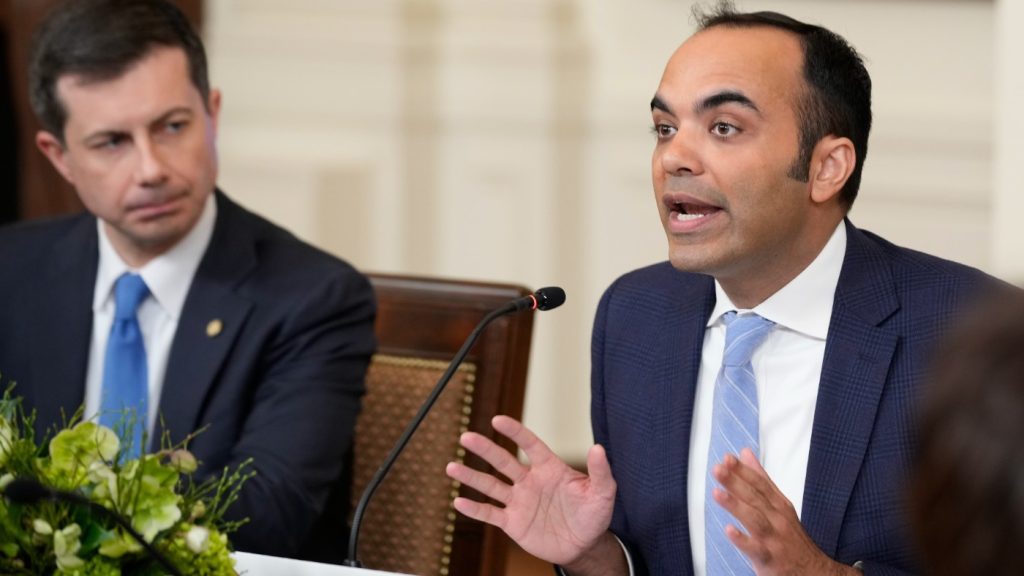Many Americans love credit card and airline rewards, but officials in the Biden administration are concerned that aggressive marketing and the dominance of large companies in the industry may be harming competition and consumers.
The Consumer Financial Protection Bureau (CFPB) and the Department of Transportation held a joint hearing on Thursday about the impact of and issues facing these rewards programs. Transportation Secretary Pete Buttigieg referred to them as an “important part of our savings.”
Around 550 million credit cards are in use in the U.S., and “credit card rewards take center stage in the industry’s marketing blitzes,” explained CFPB Director Rohit Chopra.
Airlines and credit card companies entice customers to sign up for cards by offering large points packages for new sign-ups, which can add up to hundreds of dollars, and other perks such as airport lounge access.
Chopra stated that the agency’s initial review of the fine print found that issuers can quickly and dramatically devalue those points by making it more difficult to redeem points, limiting redemption options, and inflating the point price for goods and services.
Buttigieg mentioned an example of a $9 sandwich on a flight costing 1,100 miles, or roughly $11, and questioned Scott DeAngelo, executive vice president and chief marketing officer at Allegiant Air, about it.
In 2022, the largest U.S. banks paid $68 billion in credit card rewards, while credit card issuers collected a record $130 billion in interest and fees, according to a CFPB report issued last fall. The report highlighted the danger of consumers choosing cards with higher APRs for the points and perks alone and then ending up carrying a balance.
With total credit card debt at an all-time high, exceeding $1.1 trillion at the end of last year, Chopra expressed concern about issuers’ heavy focus “on ways to entice customers using features other than the real cost of credit, the interest rate, and fees they charge.”
Buttigieg stated that rewards programs can often encourage a customer to not choose the product with the lowest price, and the administration wants to understand the impact of rewards programs on competition and market behavior.
The hearing is part of the Biden administration’s efforts to combat junk fees, which are hidden costs or unexpected fees that critics say add up and obscure the true cost of a good or service.
The CFPB and other agencies have increased efforts to crack down on junk fees, leading to resistance from the business community. The U.S. Chamber of Commerce and other business groups sued to block a CFPB rule to cap credit card late fees at $8.
Notably absent from the hearing were executives from major players in the airline and credit card industries, including Visa, Mastercard, United Airlines, and Americans Airlines, who refused to testify before the Senate Judiciary Committee about credit card competition last month.
Visa, Mastercard and the Electronic Payments Coalition (EPC) are in a fierce battle with retailers and Senate Judiciary Chairman Dick Durbin (D-Ill.) over the senator’s Credit Card Competition Act.
The bill would make the biggest financial institutions — those with over $100 billion in assets — provide at least two network options for processing credit card transactions.
At least one of those network options cannot be Visa or Mastercard, which currently together control 80 percent of the credit card interchange market in the U.S., sparking a high-stakes lobbying battle.
The industry claims that if the bill is approved, it will eliminate funding for credit card rewards programs. Nick Simpson, managing director of communications and public affairs at the EPC, urged lawmakers during the public portion of the hearing to reject the Credit Card Competition Act.
“Regulatory and legislative threats like the Durbin-Marshall bill will put these programs in danger, and if they were to be removed, small businesses would have fewer customers and tourism-heavy municipalities would see less tax revenue,” Simpson said.
Speaking from the Senate floor Wednesday, Sen. Roger Marshall (R-Kans.), who co-sponsored the bill with Durbin, criticized the “Visa-MasterCard duopoly [that] has used money and influence in Washington to divert politicians’ attention from predatory swipe fees.”
“I never could have imagined the uphill battle we’d face up here to do the right thing for doing what’s best for hardworking Americans who are living paycheck to paycheck,” Marshall said.









